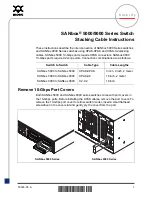
50
Figure 14 Connecting the host and IP phone in series
Connecting the IP phone to the device
As shown in
, IP phones are connected to the device without the presence of the host. Use
this connection method when IP phones sends out untagged voice packets. In this scenario, you
must configure the voice VLAN as the PVID of the access port of the IP phone, and configure the port
to forward the packets from the PVID.
Figure 15 Connecting the IP phone to the device
Voice VLAN assignment modes
A port can be assigned to a voice VLAN automatically or manually.
Automatic mode
Use automatic mode when PCs and IP phones are connected in series to access the network
through the device, as shown in
. Ports on the device transmit both voice traffic and data
traffic.
When an IP phone is powered on, it sends out protocol packets. After receiving these protocol
packets, the device uses the source MAC address of the protocol packets to match its OUI
addresses. If the match succeeds, the device performs the following operations:
•
Assigns the receiving port of the protocol packets to the voice VLAN.
•
Issues ACL rules to set the packet precedence.
•
Starts the voice VLAN aging timer.
If no voice packet is received from the port before the aging timer expires, the device will remove the
port from the voice VLAN. The aging timer is also configurable.
When the IP phone reboots, the port is reassigned to the voice VLAN to ensure the correct operation
of the existing voice connections. The reassignment occurs automatically without being triggered by
voice traffic as long as the voice VLAN operates correctly.
Host
IP phone
Device
Voice gateway
Summary of Contents for S6850 Series
Page 108: ...48 WGE1 0 3 32768 49153 50100 0x7b 0001 0001 0001 ACDEF...
Page 259: ...21 6 N A 200 6...
Page 337: ...ii...















































